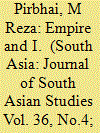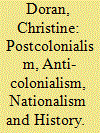| Srl | Item |
| 1 |
ID:
126174


|
|
|
|
|
| Publication |
2013.
|
| Summary/Abstract |
Framed in a discussion of post-colonial approaches to the British Empire's influence on culture, a close reading of Captain Donald Campbell's late eighteenth-century travelogue contextualises the personal particularities in his assessments of Habsburg Europe, Ottoman West Asia and Mysorean/British South Asia. His is an imagination in which the bonds of 'religion' ameliorate the 'otherness' of continental Europeans, while his concept of 'enlightenment' learning is deployed to understand the Ottomans. Only in the case of South Asia is the very humanity of the 'other' denied. I argue that this landscape of otherness reflects the coincidence of the interests of his 'self' and the 'Empire', which overlap most thoroughly in South Asia. Campbell's travelogue is of value to post-colonial approaches, as it is a particularly poignant example of the manner in which the particularities of the 'self' contribute to the construction of broader cultural discourses permeated by 'Empire'.
|
|
|
|
|
|
|
|
|
|
|
|
|
|
|
|
| 2 |
ID:
167046


|
|
|
|
|
| Summary/Abstract |
One of the most outstanding historical developments of the twentieth century was the gaining of national independence from imperial rule by most of the formerly colonized countries, especially in Africa, Asia and the Pacific. Yet, rather surprisingly, many of the leading contributors to postcolonial theory, including Edward Said, Gayatri Spivak, Homi Bhabha and others, tend to minimize the significance of national independence and take a dim view of the nationalist movements, leaders and ideologies that struggled for it. The aim of this article is to probe the reasons for this, canvassing postcolonial theorists’ main arguments and outlining certain intellectual currents and commitments, notably poststructuralism, deconstruction and postmodernism, that have contributed to these negative stances. Some counterarguments are presented, as it is suggested that the achievements of nationalist revolutions in the former colonies should be reassessed more favourably. This could be a way of resisting the current hegemonic power of the ideology of globalization.
|
|
|
|
|
|
|
|
|
|
|
|
|
|
|
|